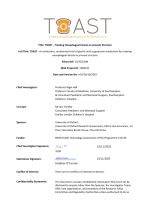Information for Clinicians
The Feasibility Study
We conducted a feasibility study before starting the main trial. A feasibility study is used to help us to understand the acceptability to parents and clinicians of the proposed trial. It will help us to design a project that is as parent and patient centred as possible.
The project included 51 clinicians looking after babies with oesophageal atresia abd 18 families of such babies to explore what is important to them and whether they would be willing to take part in a trial. This was done through a combination of interviews, an online survey and focus groups.
The study explored trial feasibility and acceptability, design aspects and additional clinical questions, such as equipoise of clinicians, willingness of clinicians to approach parents and practitioner training needs.
Overall, our findings indicated that the trial is acceptable to parents and practitioners, and gave some recommendations for changes to the protocol, information materials and site training package.
The final published paper can be found here:
The TOAST Trial
As the feasibility study is now complete, and the main trial is being set up ready to recruit. As part of this some hospitals are being contacted to see if they would like to take part.
In this randomised controlled trial, babies with oesophageal atresia will be allocated at random to either being given acid suppressing medicine or not. They will then be followed up for 2 years, to see if they develop a stricture and require any further treatments.
If you have any questions about the study, you can contact the TOAST study team at the University of Oxford by emailing toast@npeu.ox.ac.uk.






